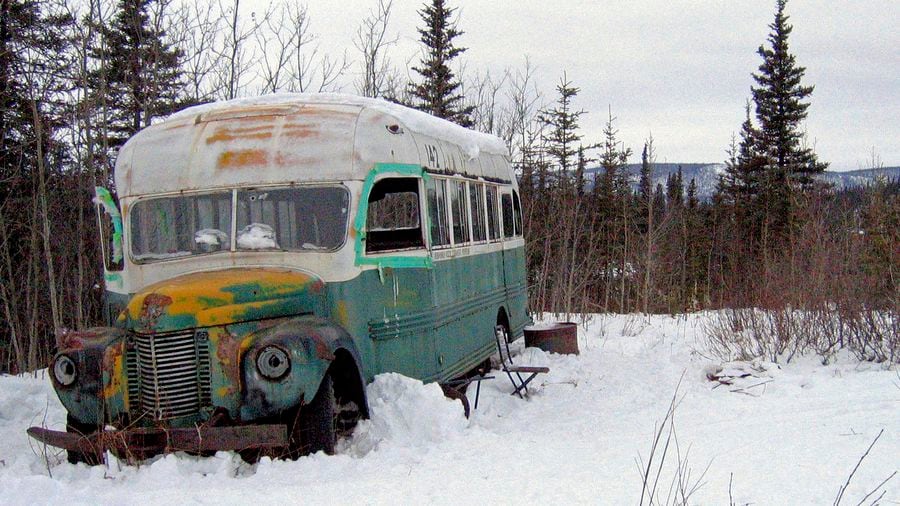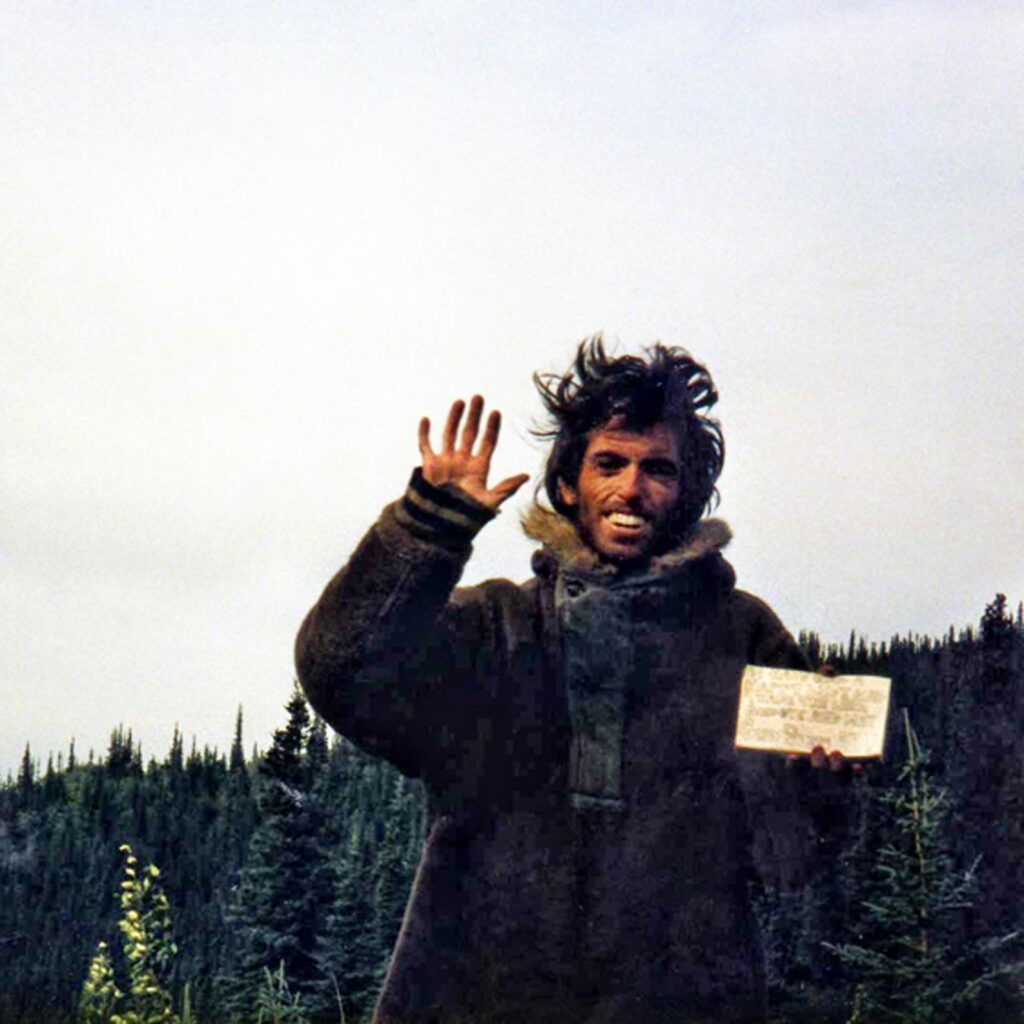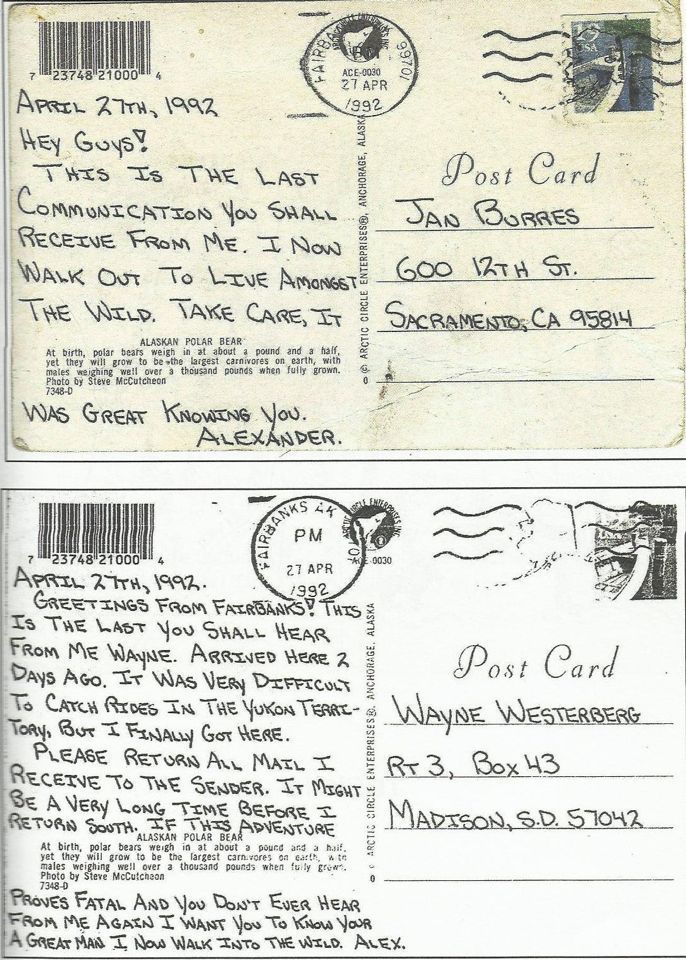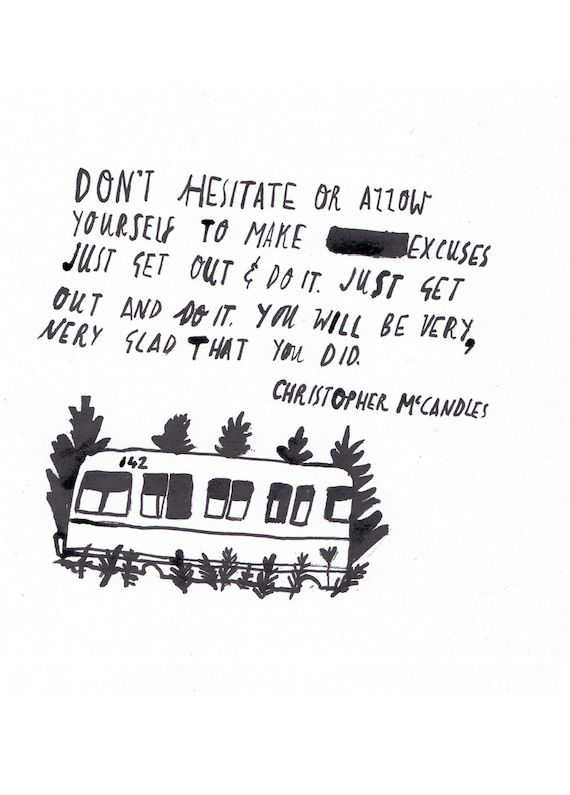The film starts off by taking you through Fairbanks, Alaska, which was cool because I do not recall ever seeing Alaska land or the Big I in a film before seeing into the wild. Right of the bat you are witnessing Christopher McCandless’s (main character) arrival to Alaska. Chris is dropped off by a guy in a truck in front of the woods, you can tell that the man feels Christopher is not properly prepared for the harsh terrain of Alaska. He gives him some winter/rain boots with his number in them in case Christopher changes his mind and decides to re-enter society. He leaves his belongings on the man’s dashboard, which is on brand for Chris since he gave away his savings of 24,000 dollars to charity and abandoned his possessions for the journey. He is on a mission to detach from societal standards.
After Christopher gets dropped off by the man in the white truck he ventures through the woods until he stumbles on an old bus. I gathered that finding the bus brought a sense of excitement and relief to him. He let out a few howls, you can tell he craves his own version of freedom. Chris began to make the bus his own. The land and the animals spark true emotion in him, you can see that he is in awe of the caribou by how his eyes watered looking at them.
When Christopher talks to himself or when he is carving his thoughts onto wood you can sense that he is aware that society and especially his family feel he is taking an extremist approach in the ways he goes about searching for freedom and new identity.

The movie takes us back two years prior to the discovery of the “magic” bus. The scene is Christopher’s graduation. This scene was interesting to me. He recites a poem to his sister that is about a child who wishes his parents never got together. He did not write this poem, but he tells his sister that they both could relate to the original author and passed the book to her. Later in the movie we discover his mother and father’s arguments would turn violent and that his father had a family he abandoned for his mom. This made him question everything; however, he never confronted his parents. This gave me an insight into how his parents’ complicated relationship deeply impacted Chris.
After graduation he meets up with his family for a celebratory dinner. His parents offered him a new car, this sparked immediate tension between them due to Christopher’s desire to detach from having unnecessary things. You can see his parents are confused by this; his father even insinuated that Chris was problematic. From my observation, one of the reasons Christopher could be anti-materialistic is due to his parents’ wealth and their desire to maintain an image of wealthiness. Which Chris views as a facade. You can just feel the disconnection through the tv. That feeling of discomfort drove Chris to his love of books, truth, and eventually his journey to Alaska.

As the film continues you are taken along as Chris makes his way through cities, states, deserts, water, and mountains. Whether by foot, kayak, train, or car he was determined, naive but always willing to learn. He never hesitated to hop on the opportunity to learn new skills and working jobs to earn money for his trip. During this process he met good people who fell in love with his eccentric personality and out-of-the box world views. Chris displayed empathy, gratitude, and desire for those he encountered to go after their dreams and to find beauty in everything.

My deeper observations
The main characters longing for purpose outside of the expectations placed on him by either his parents or society as a whole is deeply relatable. I’ve been there, I felt that exact emotion. I do not think it is abnormal for a young adult to question how they were raised, their religion, and the world around them. However, when the film starts to present the audience with the traumatic experiences Chris faced throughout his life you start to question the driving force behind such a drastic environmental, economic, and identity change. When he made the decision to leave everything behind, he never informed his family. Not even his sister who he shared a close bond with. He also referred to himself as Alexander. When confronted about his family Chris would often times avoid the topic or give vague responses. Up until the end of the movie Chris remained optimistic and motivated, it almost tricks you into believing that he isn’t running away from his pain. When I analyze the main character with intention to relate it back to what I’ve learned so far in class, I feel like Chris (main character) displayed obvious defense mechanisms such as avoidance coping and was experiencing a form of an identity crisis. If he would have taken more time to plan and home in on his survival skills before going off the grid and reaching out to his sister at any point during the two years while he was away, I would look at it differently. In the end he lost his life to starvation and was found two weeks later by hunters that came across the bus. I will say that I deeply respect anyone who is brave enough to take such a bold stance on what they believe in. Christopher McCandless left a note that stated ” I have had a happy life and thank the lord. Goodbye and may God bless us all. ”


Comments
5 responses to ““Into the wild” a journey of one’s definition of freedom.”
I think you really made some great observations. When you mentioned some of his coping mechanisms of avoidance and his drastic change to be everything his parents weren’t. It makes me sad the detachment from his sister. I do think he was having an identity crisis as most young adults try to find their way however, his was so extreme. There are so many different ways to become minimalistic, enjoy nature, make sure you know proper wilderness survival especially in new areas. I enjoyed your take on this movie. I have always wondered what this mans life would have been life if he had a little intervention.
For sure, I think we all question who we are and who we want to be. I appreciate his drive to make his own way in the world. If only he took time to learn how to properly hunt and practice survival skills.
Hey there. Thank you for your descriptive narration of this movie. When I lived in New York, we were given this book to read for English class. I remember from the beginning, it captivated my attention. As a 9th grader who moved from Alaska as a young child against my will, having the opportunity to read about something like this was super intriguing. I had kind of lost that “connection” to my culture because of separating from it and conforming to “white way”. The Indian Removal Act is the best way I can describe this. You are with your people one day and the next you are surrounded by strangers who are completely different from you. I felt outnumbered. Like I would go to school and talk in my language, or where my fur hat and my classmates made fun of me. As a teenager who cared about what others thought of me, I refrained from acting native as a means to fit in. Even then, I never really fit in. It was a very lonesome and depressing time. Now that I am back home, I have regrets for not being true to myself. It goes to show that not being kind or accepting someone for who they truly are, has so much influence on that other person’s worldview. Going back to “Into the Wild”, McCandless failed to take a minute to stop and think about what it was he was about to do. It is surprising to me that someone who was as educated as him made the choices that he did. Either he genuinely thought that he could get away with aimlessly living in the woods with nothing but a 10-pound bag of rice and a little rifle, or, he had a death wish. Now that I am older and reflect on the situation as a whole, the circumstances of his death are no one’s fault but his own. That sounds insensitive, I know. But what did he think would happen? As it relates to culture, being that he did not take the time to consider indigenous ways of living (sustenance, superstitions, etc.) on native lands is perplexing to me. Perhaps he would’ve made different choices if he had done otherwise. Also, the story gave a false pretense to those who would visit Alaska to see the “magic bus”. Expectation versus reality probably sunk in when they came up here to explore the actual bus. I think that’s why they removed it a couple of years ago. Thank you again for sharing!
Hey! No, thank you for sharing a sensitive time in your life with me. I can relate to the feeling of regret when you look back on moments in life where you feel like you shrunk yourself to adjust to your environment. It can be a hard pill to swallow. But it is a part of the process in finding the true discovery of you. Now you know more than ever who you are. It’s unfortunate Chris McCandless will never get the luxury of being older and reflecting on his life in this way. Although, it does seem like he found joy in his journey to Alaska and the people he met along the way.
Hi Adrianna, this was an excellent movie and my first time watching it. Christopher died from eating wild sweet peas that were poisonous. He thought it was the wild potato Alaska carrot which are edible, and the plants looked alike. If left untreated, it would lead to starvation and death. I think he was too weak from the poison to walk and get help, it was like he was accepting his death. What I thought was crazy was how the Grizzly bear walked up to Chris and sniffed him, it was as if the bear smelled death, and just walked away. “HAPPINESS ONLY REAL WHEN SHARED.” I thought this was a profound statement. “I HAVE HAD A HAPPY LIFE AND THANK THE LORD. GOODBYE AND MAY GOD BLESS ALL! It seems that from this quote he was ready to die. I’m sure he believed that he was going to heaven, as he grew up going to church, but ended up leaving it for his reasons. That’s why he thanked the Lord before his death. Thanks for your blog, I enjoyed reading it.